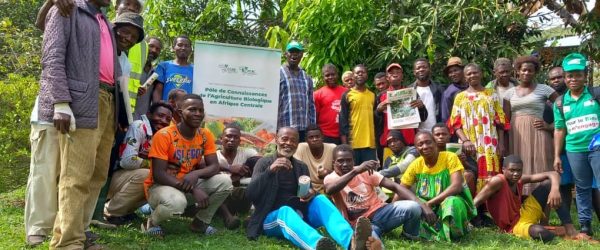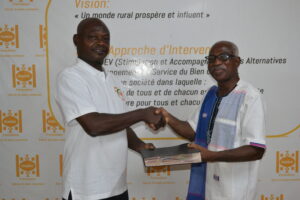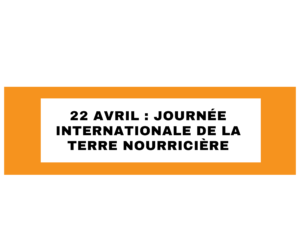The training of learners in the site of the multiplier YENE Zacharie took place on Saturday 11 and Sunday 12 March 2023 in the locality of Mfou, more precisely in Mvog-Eboa. This training focused on two modules: maggot production from the black soldier fly and the‘breeding of chafer (edible white worms).
As a prelude to this training, Inades-Formation Cameroon, a partner organization in the implementation of the PCAC project (Knowledge Center for Organic Agriculture in Central Africa), carried out several activities, including the identification, acquisition and development of the site at the YENE propagator’s, in Mfou
This training session in the multiplier site allowed to reinforce the capacities of twenty-five (25) actors of the civil society including three (3) women and twenty-two (22) men coming from different socio-professional backgrounds (teacher, clergyman, farmer, agronomy student, veterinarian, farmer, mechanic).
The content of the session was based on the duplication of the training previously conducted at the Farm Agro Pisciculture of Esse (FAPE), on the production of maggots from the black soldier fly. In addition to this theme, an additional module was given on the breeding of chafer or white worms, also called “Foss” in the local language.
The two modules aimed to strengthen the participants’ capacities on the implementation of an efficient production system of “Foss” white worms and “maggots” in the locality of Mvog Eboa. For the master trainer Stéphane FOUAPON, an agronomist, “the production of new forms of food is of great interest in the face of problems of malnutrition and poverty. Let us recall that the larvae of palm weevils, commonly called “Foss” in the Central region of Cameroon, are a very popular and widespread food in this region. They are extremely rich in nutrients (proteins, carbohydrates, lipids) and have an energy value comparable to that of beef or fish (rich in proteins and Omega 3 and 6). They are also an excellent source of minerals and vitamins.

In Cameroonian markets, this product is sold in batches of about twenty in breakable glasses ranging from 2,000 to 3,500 FCFA depending on the season. These larvae are more abundant and less expensive in the rainy season.
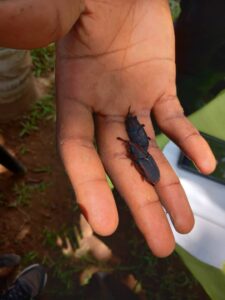

Presentation of the black soldier fly breeding device
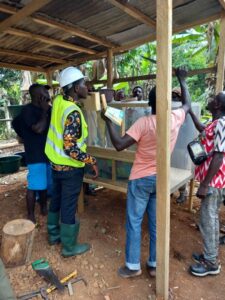
Why start breeding Foss and maggots?
These two (2) elements are very rich in proteins, carbohydrates, lipids, Omega 3 and 6/ They are excellent dietary supplements for people of all ages (elderly in particular), regardless of their health status. The breeding of Foss, as well as the breeding of maggots from black soldier flies, is not harmful to the environment, contrary to other conventional breeding which pollute by their smell and their waste. The financial aspect is also an asset, because the cost of the initial investment is not high enough and the breeding expenses are negligible. Their production does not require large areas. White grubs multiply in a very short cycle and in large quantities. Their breeding can be practiced in all areas of Cameroon. They are used as food for other animal species: in fish farming for example, due to the high demand for protein, or in chicken farming.
The constitution of domestic breeding tanks
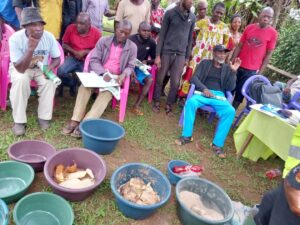
The tank for the production of white worms is composed of male and female chafer (about three (3) females for six (6) males) from the heart of the palm tree, pig starter feed, cassava, coconut bagasse peelings and water. The Foss will be harvested after 30 days, while in the case of maggots, the production is done in the fly house from a substrate based on pig manure, in a bowl above which are placed wooden bars called “pondoirs”, soaked in a substance called egg attraction.
The training sessions aim to disseminate the practice of Organic Agriculture on the one hand, and on the other hand, to equip as many actors as possible at the local and national level. The PCAC project is funded by GIZ and implemented by five (5) partner organizations in Cameroon, namely: the African Institute for Economic and Social Development (Inades-Formation Cameroon), the International Center for the Promotion of Creation (CIPCRE), the Support Group for Sustainable Development (GADD), the Multipurpose Training Center of Mbouo (CPF) and the Support Service for Local Development Initiatives (SAILD).
Marguerite MOMHA, Communication Inades-Formation Cameroon.

